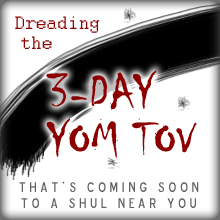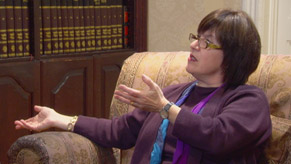Archive for the ‘Jewish Community’ Category
Survival Guide to the Three-Day Yom Tov
As most of us are dreading the upcoming “three-day” chag, we here at Newsy Jewsy came up with a few tips to help you survive it – and actually make it through feeling great!
Here are our tips:
- Memorize all your status updates as they occur, so you can post them immediately after Yom Tov. (You know, at the pizza shop.) The best way to memorize them is to recite each 100 times as you walk to and from shul. The correct response to “Good Yutif/Good Shabbos” is simply a smile.
- Always walk around with a sefer. If you’re single, your shidduch chances go up exponentially. If not, at least you’ll have an excuse to duck when Aunt Shelly starts yapping about this or that.

- The moment Hallel goes over 2.38 minutes, just slap your forehead with your palm, and run out of shul like you forgot something. If you want to come back in, just bring that handy sefer. Works every time.
- Bring ear plugs to shul in case the rabbi’s drasha is too loud.
- At the start of mussaf, remember to bang on the nearest hard surface so everyone knows you remembered it was Yom Tov.
- Remember the halacha – If there is no cholent at Kiddush, skip it, there’s plenty of food at home. If there is cholent, but no MEAT in it, skip it. If there is no cholent, but there is potato kugel, some say skip it, others are meikil and permit it.
- Forget the shower. When things get tough, make this yeshiva-style ready-mix in just five minutes: Stir 2 parts deodorant, 2 parts air freshener, and 1 part Shout. Spray ready-mix on clothes, toilets, or the person’s seat next to you as necessary. It’s all good.
- Always nap like it’s Shabbos. Even if it’s Thursday.
- Bolt out before havdallah and find the nearest pizza shop. Give us your status updates: Did you survive your Three-Day Yom Tov??
Chag Sameach everyone!
Special thanks to Marissa for this post idea.Top 5 Ways You Know You Aren’t Over Pesach Yet
It’s Pesach Sheni and a full month has passed. And yet you find yourself still strangely in the clutches of that surreal post-Pesach fog. It’s bizarre, it’s weird, it feels odd, but it’s…real.
To better treat your unfortunate malady, we here at Newsy Jewsy developed a diagnostic tool to determine the extent of your problem. And as a free service to you, we offer you here the top five ways you know you haven’t gotten over Pesach yet:
5. You still lunge at a fresh piece of bread – as eagerly as you did motzaei yom tov.
4. You still haven’t uploaded the album “Pesach 2012” to fb.
3. When you see people, you’re still asking with that annoying tone (and as if it really matters), “So where were you for Pesach…?”
2. You still check the scale every day with the desperate hope of meeting your pre-Pesach weight.
And the most precise way you know you haven’t gotten over Pesach yet:
1. You’ve actually been caught enthusiastically discussing Pesach plans for next year.
If you suffer from any of these emotional disturbances, it is recommended that you begin to make changes in your life that will help you move past Pesach. This is imperative, as you will need your wits about you and your mind at its sharpest – especially since we begin Pesach cleaning next week.
Happy Pesach Sheni everyone!
Identity and Irony: Oprah’s Review of Hasidic Jews
Oprah’s visit to Hasidic Brooklyn aired on Feb 12, 2012 from 9-10 pm and on Feb 13, 2012 from 10-11 pm on OWN, the Oprah Winfrey Network.
As an insider when it comes to Orthodox Judaism (though not the Hasidic brand), I eagerly anticipated Oprah’s two-part series. How would “we” be represented?
I had seen Oprah’s after-taping interview with Chabad.org (a MUST-WATCH) and saw how positively she felt about the spiritual teachings she gleaned from her visit. I was very excited for Oprah to have such a positive view of Judaism.
As it turns out, however, the narrator began by reminding us that the show was only about Hasidic Jews. I was not going to be represented. “Ok,” I thought as I settled down to watch, “if it’s embarrassing, at least she isn’t talking about me!”
But the irony was that she WAS talking about me.
I’m not Lubavitch, I’m not even Hasidic, but I knew everything Oprah learned. I felt everything she learned. I felt it as an insider, and I especially identified with the sheitel-wearing ladies in Part II.
Oprah was smart to invite the ladies to a candid chat. As she says at the end of the episode, she got exactly what she came for. She connected with the women, she understood them, and she felt a common bond.
As an insider, it was pretty powerful. I’ve always liked Oprah and admired her success, but now I understand why she’s so successful. She’s open, warm, inquisitive, and blunt (all at the same time) and this is what makes her so likeable. She did an amazing job in Part II, helping the women feel at ease, respecting them, asking good questions, and listening to them.
There was one middle-aged lady sitting to Oprah’s left, next to Shternie Ginsburg. I don’t know her name (I think she was Chaya), but in my mind, she represented the rebbitzens of the world. She was smart, articulate, she exuded leadership, and her tone was very spiritual. She was truly a beautiful person.
Oprah was a complete outsider, but she managed to tell a tale of friendly Jewish women who value community, raise their kids in a wholesome way, and love their husbands. She is a genius.
I know that the vast majority of Oprah’s viewers may never know that the people she met were Lubavitchers, and that Lubavitch is just one type of Hasidim. And they may never know that there are non-Hasidic types of Orthodox Jews.
But Oprah’s brief glimpse into these people’s lives showed religious Jewish women with values, personality, confidence and a lot of love. Whether a person is an insider or an outsider, the show was both meaningful and inspiring.
I have to admit that in the beginning of the first episode, I wondered why there was no reference to the 18th century or the Holocaust. And I didn’t understand why she focused so much on marriage, Taharat Hamishpacha, and TV. I felt like there was so much more of our identity that she was missing. I worried that she was ignoring the forest for the trees. But by the time I finished watching the second episode, I understood that through this tiny slice-of-life lens and the perspective of Lubavitch, she was able to weave a beautiful story in which we—all Jewish women—had a starring role.
 And so I thank Oprah for NOT focusing on the bigger picture. I thank her profusely for not mentioning the debate within Lubavitch about the Rebbe’s potential messianic status. I thank her for NOT mentioning the differences between Lubavitch, Belz, Bobov, Satmar, and Ger. And I thank her for NOT reminding us of painful periods in Jewish history.
And so I thank Oprah for NOT focusing on the bigger picture. I thank her profusely for not mentioning the debate within Lubavitch about the Rebbe’s potential messianic status. I thank her for NOT mentioning the differences between Lubavitch, Belz, Bobov, Satmar, and Ger. And I thank her for NOT reminding us of painful periods in Jewish history.
Instead, she met with families, chatted with women, and showed short vignettes of life around town. We saw a wedding, a kosher restaurant, a wig store, a Judaica store, and even the Mikvah. Through this lens, she captured a vibrant culture with positive goals and much to look forward to.
And all Jewish women can thank Oprah for that.
There’s more on Oprah’s visit to Hasidic Brooklyn, including exclusive “webisodes” on OWN’s Website.